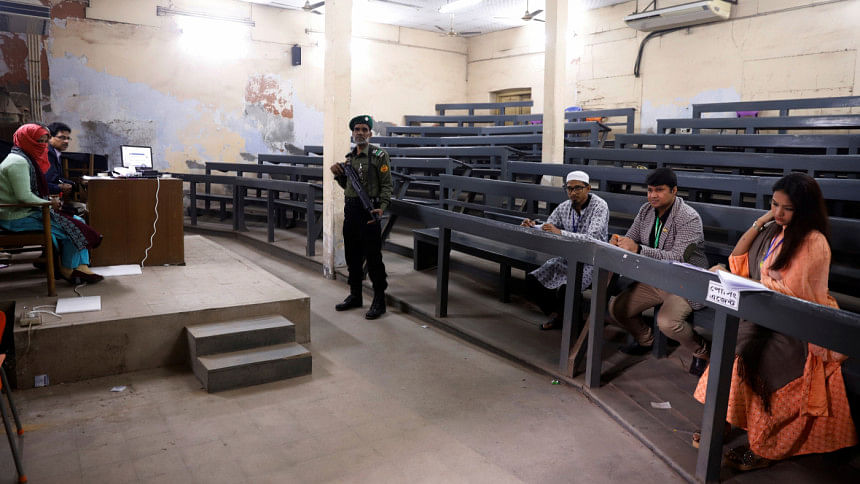Voting in an intimidated and monopolised space

By all credible indications, voting in the two city corporations of the capital has taken place in an uneven playing field—an electoral space that has been intimidatingly patrolled to ensure its monopolisation.
To be sure, the elections have been held in a context that had hardly any reason to create any reasonable amount of trust among voters. So they didn't think their efforts to cast their vote would make any sense.
At the core of the factors that led to this lack of trust amongst voters is not only the experiences they have gone through during the last national election and a series of local elections held before and after that, but also the unprecedented impotence of the Election Commission (EC), which has subjected itself to self-inflicted humiliations through loss of dignity and credibility. The EC is a constitutional body currently headed by a CEC and Commissioners whose potential to deliver anything near a free and fair election has been questioned from day one. The internal tensions and differences of opinion among the commissioners on various issues have been craftily manipulated to transform an official of the commission, who is supposed to be reportable to the Commissioners, into the most powerful factor in decisions, actions and interpretations of the EC.
Against this backdrop, with the full-fledged introduction of electoral voting machines (EVM), as much as it could be viewed as an opportunity to take the challenge to restore some semblance of trust, the Commission has acted just the opposite, demonstrating an all-round insensitiveness to a series of complaints of violations of electoral rules and codes since the announcement of schedules till date. The potential gains of EVM have not only been overshadowed by well-designed and strategic moves to monopolise the electoral space, but also by creating an atmosphere of subtle and not-so-subtle intimidation and deterrence against voter turnout, polling-centre patrolling and booth capture, including the supposedly covered space meant to ensure the confidentiality of the voter while voting.
The low voter turnout is a symbol of lack of trust in the capacity of the EC that has eroded the value and dignity of people's right to vote, and apathy to a political culture where only a handful of the high and mighty—not the voters—determine who goes to power.
The restrictions on media and other stakeholders who wanted to observe the election only demonstrate a rather brazen example of how the space was designed to be manipulated and a sheer lack of confidence that a free and fair election is not affordable.
In an apparent dead-end where there is no indication of a light at the end of the tunnel, it is the political parties who must first transform themselves in a paradigm shift under which they have to recognise that the mandate to obtain the lease of state power lies with the people, and not with manipulations, however crafty they may be. They must realise that what is happening is not only unsustainable but also shutting down all prospects of a peaceful transition of power, which can in the end only be counterproductive to themselves and to the democratic future of the nation.
The main burden of failure to conduct genuinely free and fair elections lies with the EC. The electoral laws, despite some deliberately created deficits, are still good enough to deliver nationally and internationally acceptable elections as shown in the not-so-distant past when the present regime came to power to start with. There is no doubt that the difference is made by the wrong people being entrusted with state functions that are too important. This must change—the EC must be headed by people competent enough to understand the sanctity of the power they are entrusted with, deliver their job without fear or favour, and at least not let the commission be dictated by its biased and partisan staff. They must be courageous enough to realise that it is the degree of trust and credibility of the EC that determines the rate at which people are motivated to come to the polling centre.
No less important is the bigger issue of depoliticisation of the law enforcement agencies and administration that play a crucial role in elections. Finally, despite growing intimidation and a shrinking space, the media, civil society, and people in general must raise their voices loud and clear about the constitutional right of the people as the source of all power. The media, in particular, cannot enter into its shell, nor can it allow itself to be co-opted, compromising their fundamental principles. Professional integrity, transparency and accountability are the best available capital in the hands of the media and civil society to successfully and effectively navigate in the abiding context and catalyse change in the public interest.
Dr Iftekharuzzaman is Executive Director, Transparency International Bangladesh.

 For all latest news, follow The Daily Star's Google News channel.
For all latest news, follow The Daily Star's Google News channel. 



Comments